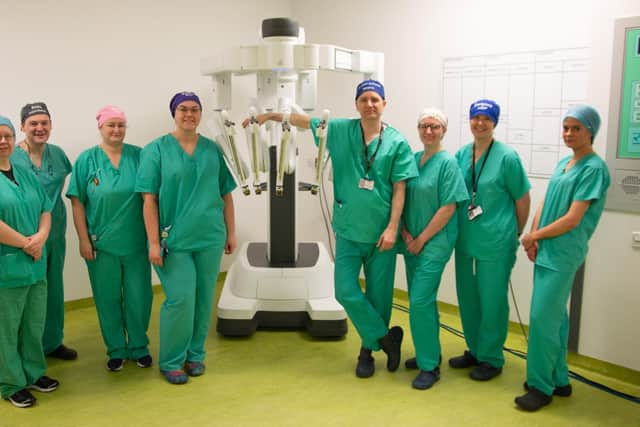Pioneering robotic surgery helps more than 500 cancer patients in Fife
and live on Freeview channel 276
Funded by the Scottish Government at a cost of around £2.2m, the Victoria Hospital in Kirkcaldy was the first District General Hospital in Scotland to adopt robotic-assisted surgery (RAS).
The technology was introduced in August 2021 and is currently used in colorectal, gynaecological and urological surgery. In an important milestone for NHS Fife, the 500th robotic procedure was recently carried out by the team at the Vic.
Advertisement
Hide AdAdvertisement
Hide AdThe DaVinci robotic system is used by experienced laparoscopic surgeons, who operate the console device from within the theatre itself. A total of eight consultant surgeons across a range of specialities are now trained in the robotic system.


In the just over two years since its introduction, RAS is improving outcomes for an increasing number of patients in Fife. In addition to reducing post-operative pain, the technology is more precise which allows procedures to be carried out with more ease, especially during difficult aspects of the operations. It is helping to shorten the average length of hospital stay, speeding up recovery for the patients, whilst reducing the chances of readmission.
Mr Satheesh Yalamarthi, consultant surgeon and clinical director, who oversees the robotic-assisted surgery programme in Fife, said: “The Da Vinci system allows surgeons to work with even more precision than other conventional types of surgery. This is hugely important as it means that surgery can be done more safely. It enables a smoother recovery, with less pain or discomfort, lowers the risk of developing complications after surgery and hence a shorter stay in the hospital.”
Since the programme began in Fife in 2021, the numbers of RAS procedures carried out has steadily increased, with the average number of procedures carried out each month almost doubling over the course years.
Advertisement
Hide AdAdvertisement
Hide AdClaire Dobson, director of acute services, said: “We have a highly innovative and forward-thinking theatre team, with a proven track record of safely introducing new and pioneering surgical techniques. This has helped us to embed this new approach quickly and steadily increase the number of RAS procedures we can carry out.
“In addition to helping improve patient outcomes, developing our RAS programme helps makes our service more attractive as we seek to recruit and retain experienced clinical staff, as well as future generations of surgeons, to posts here in Fife.”
The ability to carry out RAS locally has enabled NHS Fife to carry out prostate cancer surgery in Kirkcaldy, where previously patients had to travel to Lothian for such procedures.
Dr Christopher McKenna, board medical director, said: “Our surgical teams have really embraced this technology and are continually working to maximise the benefits it offers to the population we serve.”He added:This has allowed us to steadily increase the number of patients in Fife receiving robotic-assisted surgery, and is enabling those requiring procedures for prostate cancer to receive this right here in Fife.”